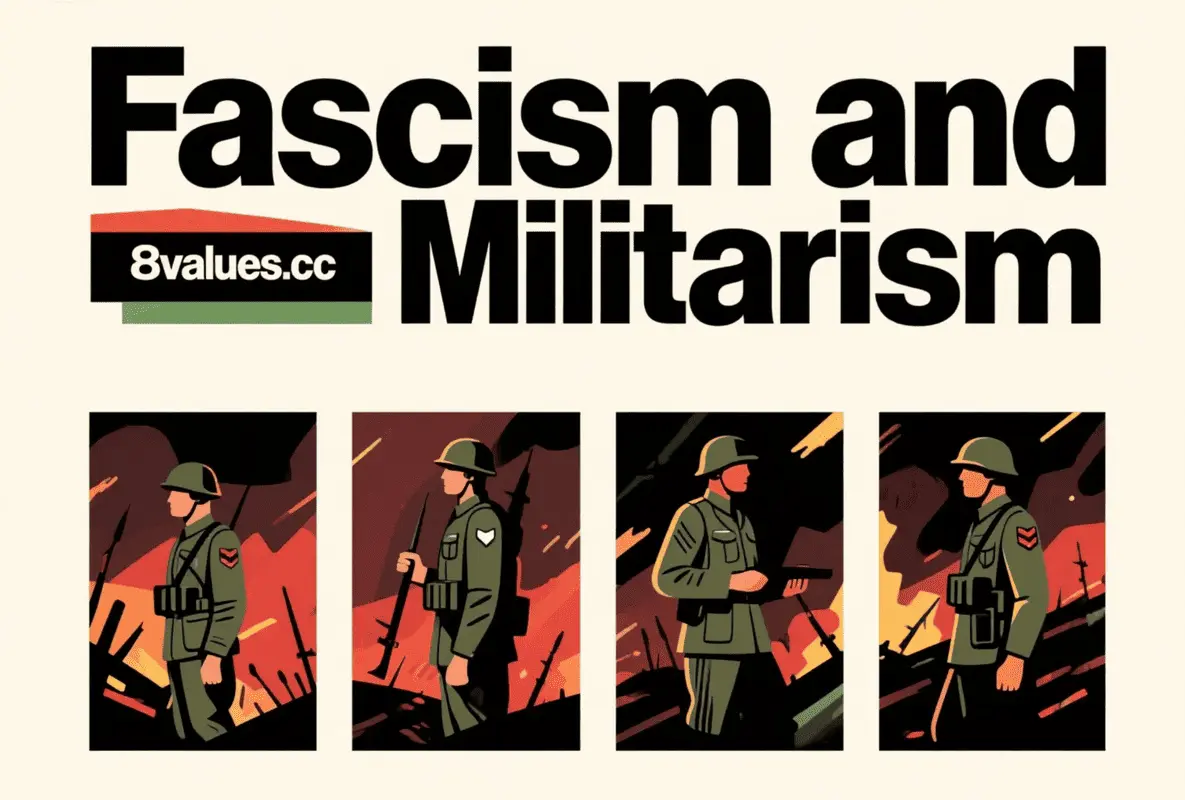Faschismus und Militarismus: Zwei Aspekte der totalitären Herrschaft
Eine tiefere Diskussion über die Definitionen, die Kernmerkmale des Faschismus und des Militarismus und die Art und Weise, wie sie mit Totalitarismus und nationalem Totalitarismus zusammenhängen, und ihre tiefgreifenden Auswirkungen auf die Gesellschaft und die Welt analysieren, indem sie historische Fälle wie nationalsoziales, faschistisches Italien und japanischer Militarismus als Beispiele nehmen.
Faschismus und Militarismus sind zwei hoch kontrollierte und bedrückende politische Ideologien und Dominanzmodelle, die in der Geschichte des 20. Jahrhunderts eine Schlüsselrolle spielen und oft eng mit dem Konzept des Totalitarismus verbunden sind. Obwohl sie jeweils ihren eigenen Schwerpunkt haben, zeigen sie viele Ähnlichkeiten in der Streben nach staatlicher Macht, unterdrückten Dissens und allgemeine Kontrolle der Gesellschaft. In diesem Artikel wird die Natur, die Merkmale dieser beiden Ideologien und ihre komplexe Beziehung zum Totalitarismus, insbesondere des nationalen Totalitarismus, eingehend untersucht.
Der Aufstieg und die Kerneigenschaften des Faschismus
Der Begriff "totalitär" wurde erstmals von italienischen Faschisten in den 1920er Jahren als selbsternannte Regime vorgeschlagen und von italienischen faschistischen Theoretikern Giovanni Qintili und Mussolini gemeinsam gefördert. Mussolini beschrieb sein Regime als einen "repräsentativen totalitären Staat" und betonte, dass "alles im Staat ist, nichts außerhalb des Staates sein kann und nichts gegen den Staat abgelehnt werden kann".
Die Kernmerkmale des Faschismus sind:
- Nationale Überlegenheit und nationale Vorherrschaft : Der Faschismus fördert die Vorherrschaft ihrer eigenen Nation oder ihres Landes und verlangt von Einzelpersonen, den Interessen der Nation und des Landes voll und ganz gehorsam zu sein. Zum Beispiel zielt das italienische faschistische Regime unter der Leitung von Mussolini darauf ab, die Herrlichkeit des alten römischen Reiches wiederherzustellen und die Überlegenheit der italienischen Nation zu fördern.
- Leader-Anbetung und Einparteien-Diktatur : Faschistische Regime stellen die absolute Macht einer einzelnen Partei und eines einzelnen Führers her und verbieten Oppositionsparteien und unabhängige Organisationen. Die Persönlichkeitsanbetung ist ein wichtiger Teil davon, und Führungskräfte werden in Symbole und Retter der Nation geformt.
- Militarismus und externe Expansion : Faschismus betont oft Militarismus, Rassismus und externe Expansion. Der faschistische Italien war einst eine der wichtigsten Achsenmächte des Zweiten Weltkriegs und war bekannt für seine grausame Behandlung von Kriegsgefangenen und Zivilisten.
Hannah Arendt unterscheidet jedoch den italienischen Faschismus vom Nationalsozialismus und Stalinismus im Ursprung des Totalitarismus. Sie glaubte, dass der italienische Faschismus eine "nationalistische autoritäre Bewegung" war und bis 1938 kein wirklich umfassendes totalitäres Regime war. Mussolini war mit der Diktatur und einer Einparteien-Herrschaft zufrieden, ermöglichte die vollständige Massenmobilisierung nicht vollständig und ermöglichte dem König nicht vollständig und die katholische Kirche, seine unabhängige religiöse Autorität zu pflegen. Dies deutet darauf hin, dass sich der Faschismus in einigen Fällen eher als extreme Form des Autoritarismus als als Totalitarismus in vollem Sinne verhalten kann.
Die Essenz und der Ausdruck des Militarismus
Militarismus ist eine Ideologie, die Streitkräfte und ihre Interessen im Kern des nationalen und sozialen Lebens stellt. In der Regel schützt die staatliche Macht durch Militarisierung der Gesellschaft, externer Expansion und interner Repression und wird häufig mit Totalitarismus oder nationalem Totalitarismus kombiniert.
- Staatliche Kontrolle und Expansion : In militaristischen Ländern haben militärische Institutionen einen entscheidenden Einfluss auf die nationalen Politik und sozialen Strukturen. Zum Beispiel wurde das große japanische Reich während des Zweiten Weltkriegs als "Militärdiktatur" beschrieben, die von Kaiser Hirohito angeführt wurde. Das Regime fördert die Expansions- und Eroberungsrichtlinien und kontrolliert die öffentliche Meinung und Informationsumbreitung durch Propaganda- und Zensursysteme, wobei Gewalt und Einschüchterung zur Unterdrückung von Dissens eingesetzt werden. Der japanische Außenminister Yoeu Matsuoka sagte einmal, dass der Totalitarismus die Welt gewinnen wird, während sich der japanische Faschismus durch Liebe zum Kaiser entwickeln wird.
- Nationale Überlegenheit und kulturelle Instrumentalisierung : Der japanische Militarismus definiert die externe Expansion als "nationale Mission" mit den Slogans der "Yamato National Überlegenheitstheorie" und "Greater Ostasien-Co-Properity". Sie kontrollierten die öffentliche Meinung über das totalitäre System, erzwangen die Rekrutierung und setzten die "tägliche chemische Bildung" in den besetzten Bereichen um, unterdrückten die lokale ethnische Kultur und begangen eine große Anzahl von Kriegsverbrechen. Ein Dokument des japanischen Kabinettsplanungsinstituts behauptete sogar, dass Japan seit seiner Gründung "beispiellose Totalitarismus" besitzt, und dieser "ideale Totalitarismus" spiegelt sich in seinem "nationalen System" wider, das seit dreitausend Jahren unverändert geblieben ist.
- Militärische und soziale Fortpflanzung : In nationalen totalitären Ländern wie Myanmar und Sri Lanka haben die Streitkräfte einen erheblichen Einfluss auf die staatliche Macht, dominieren sogar den Staat und passen politische und wirtschaftliche Institutionen für ihre eigenen Interessen an. Dieses Phänomen der "militarisierten sozialen Fortpflanzung" zeigt, dass die Organisationsmethode der sozialen Reproduktion durch militärische Ziele und Strategien geprägt ist. Zum Beispiel unterdrückte die myanmarische Militärregierung Rohingya und andere Minderheiten im Namen des "Schutzes buddhistischer Nationen" und führte eine systematische Verfolgung durch.
- Geschlechter Gewalt und Kontrolle : In militaristischen und nationalen totalitären Ländern ist geschlechtsspezifische Gewalt ein Kernelement, das die Frontline of War und die hinteren Familien verbindet. Der weibliche Körper wird oft als Symbol für Staat und Religion angesehen und wird zu einem "territorialen Streit". Der Staat konsolidiert seine rassistische Ordnung, indem er die soziale Reproduktion kontrolliert, einschließlich der Einschränkung der Rechte der Frauen, der Stärkung der Männer mit privaten Bereichen und sogar der Gewalt der Soldaten, die aus dem Schlachtfeld zurückkehren, in der Familie von der Gesellschaft toleriert und sogar als Teil des Traumas des Krieges interpretiert wird.
Die Verflechtung des Faschismus, des Militarismus und des Totalitarismus
Obwohl Faschismus und Militarismus jeweils ihren eigenen Schwerpunkt haben, verbinden sie sich in der Praxis oft miteinander und arbeiten im Rahmen des Totalitarismus.
- Gemeinsame Kontrollmittel : Beide verfolgen im Allgemeinen strenge Zensur, Unterdrückung von Dissens, umfangreicher Propaganda, stark zentralisierter Macht und staatlicher Terrorismus, um die Dominanz aufrechtzuerhalten. Diese Mittel sollen die politische Vielfalt beseitigen, die Einbeziehung der offiziellen Ideologie erzwingen und das Privatleben der Bürger infiltrieren.
- Nationalismus Kern : Extremer Nationalismus ist eine wichtige Grundlage für diese beiden Ideologien. Sie fördern die Überlegenheit ihrer eigenen Nation, setzen nationale Interessen über alles andere und sammeln die Unterstützung der Menschen für das Regime, indem sie "externe Bedrohungen" und "interne Feinde" schaffen.
- Nazi -Deutschland : Es ist ein typischer Fall für die Kombination von Faschismus, Militarismus und nationaler Totalitarismus. Nazi -Deutschland nahm die "arische nationale Überlegenheitstheorie" als Kern, definierte Juden, Zigeuner, Slawen usw. als "minderwertige Nationen". Es förderte die Apartheid und erzwungene Sterilisation durch das totalitäre System, das schließlich zum "Holocaust" des Todes von etwa 6 Millionen Juden führte, und startete den Zweiten Weltkrieg im Namen des "nationalen Überlebensraums". Die Nazi -Partei machte deutlich, dass ihr Ziel darin bestand, einen "totalitären Staat" aufzubauen, der "alle Bereiche des öffentlichen Lebens infiltriert".
- Unterscheidung vom nationalen Totalitarismus : Obwohl der traditionelle faschistische Totalitarismus "Staat/Partei" als Kern nimmt und die "staatliche Vormachtstellung" betont, nimmt der nationale Totalitarismus "spezifische Nationen" als Kern und betrachtet den Staat als "Instrument der Nation". Diese totalitäre Herrschaft mit nationaler Identität als Kern der politischen Legitimität treibt die Exklusivität der Nation auf das Extrem und zielt darauf ab, ein Monopol einer bestimmten Nation über die staatliche Macht durch umfassende Kontrolle der sozialen, wirtschaftlichen, kulturellen und persönlichen Leben zu erreichen.
Historische Fallanalyse
- Faschistischer Italien (1922-1943) : Die von Mussolini angeführte faschistische Partei förderte die Überlegenheit der italienischen Nation, gründete einen totalitären Staat mit einer Parteidiktatur und versuchte, die Ehre des alten Römischen Reiches wiederherzustellen. Obwohl Arendt der Ansicht ist, dass seine frühen Tage nicht in vollem Sinne Totalitarismus waren, macht Mussolinis Konzept der "staatlichen Vormachtstellung" und sein Anspruch auf totalitäre Begriffe zu einer wichtigen historischen Referenz für die Entwicklung des Konzepts des Totalitarismus.
- Nazi-Deutschland (1933-1945) : Die von Hitler geführte NS-Partei betrachtete die germanische Nation als "bevorzugte Nation" und erreichte die sogenannte "nationale Verjüngung" durch totalitäre Herrschaft, ethnische Säuberung und externe Ausdehnung. Nazi-Kunstwerke hatten auch erhebliche totalitäre Eigenschaften: kalte, eiserblusige, befürwortende Ordnung und fanatische Persönlichkeitskult, die Teil der fanatischen nationalistischen Propaganda wurde, was schließlich zum Ausbruch des Zweiten Weltkriegs führte und mehr als 55 Millionen Menschen tötete.
- Japanischer Militarismus (1930-1945) : Die "yamato nationale Überlegenheitstheorie" als Ideologie, die externe Expansion ist definiert als die "nationale Mission", die die öffentliche Meinung durch das totalitäre System kontrolliert, die militärische Wehrpflicht erzwingt und die "tägliche chemische Ausbildung" in den besetzten Gebieten unterdrückt, die lokale ethnische Kultur unterscheidet und eine große Anzahl von Warnkorden besitzt. Japan behauptete sogar, in Regierungsdokumenten vor dem Zweiten Weltkrieg einen "beispiellosen Totalitarismus" zu besitzen.
Auswirkungen und Warnung
Faschismus und Militarismus als unterschiedliche Manifestationen des Totalitarismus haben schwerwiegende Katastrophen der menschlichen Zivilisation verursacht. Sie trampelten Menschenrechte und durch systemische Verfolgung, ethnische Säuberung und groß angelegte Gewalt haben sie zum Tod von zehn Millionen unschuldigen Leben geführt. Die ausschließliche nationalistische Erzählung führt zu einer sozialen Abteilung, das Land fällt in die Schließung und die äußere Isolation, behindert den wirtschaftlichen und kulturellen Austausch und bringt letztendlich die Zivilisation rückwärts.
Diese historischen Lektionen warnen uns davor, dass wir gegen die Kombination von extremem Nationalismus und Totalitarismus, demokratischen Systemen und dem Schutz des Menschenrechts wachsam sein müssen und jegliche Form der nationalen Unterdrückung und ideologischen Kontrolle ablegen. Nur durch Anerkennung der Koexistenz multikultureller Kulturen und des Schutzes der Rechte von Minderheiten kann ähnliche gefährliche Ideologien vermieden werden, erneut zu steigen und die gemeinsamen Werte der internationalen Ordnung und der Menschheit aufrechtzuerhalten.






